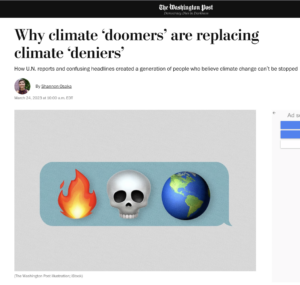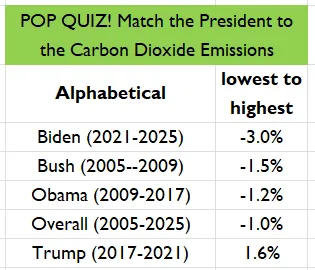https://www.washingtonpost.com/climate-environment/2023/03/24/climate-doomers-ipcc-un-report/
When Sean Youra was 26 years old and working as an engineer, he started watching documentaries about climate change. Youra, who was struggling with depression and the loss of a family member, was horrified by what he learned about melting ice and rising extreme weather. He started spending hours on YouTube, watching videos made by fringe scientists who warned that the world was teetering on the edge of societal collapse — or even near-term human extinction. Youra started telling his friends and family that he was convinced that climate change couldn’t be stopped, and humanity was doomed.
In short, he says, he became a climate “doomer.”
“It all compounded and just led me down a very dark path,” he said. “I became very detached and felt like giving up on everything.”
That grim view of the planet’s future is becoming more common. Influenced by a barrage of grim U.N. reports — such as the one published by the Intergovernmental Panel on Climate Change earlier this week — and negative headlines, a group of people believe that the climate problem cannot, or will not, be solved in time to prevent all-out societal collapse. They are known, colloquially, as climate “doomers.” And some scientists and experts worry that their defeatism — which could undermine efforts to take action — may be just as dangerous as climate denial.
“It’s fair to say that recently many of us climate scientists have spent more time arguing with the doomers than with the deniers,” said Zeke Hausfather, a contributing author to the U.N. Intergovernmental Panel on Climate Change and climate research lead at the payments company Stripe.
There are different flavors of doomers. Some are middle-aged and have been influenced by outspoken scientists — like retired ecologist Guy McPherson — who claim that human extinction, or at least the breakdown of society, is imminent. (“I can’t imagine that there will be a human left on the Earth in 10 years,” McPherson has said.) These doomers drift toward conspiracy theories, sometimes claiming that the Intergovernmental Panel on Climate Change is downplaying the seriousness of the issue.
McPherson said in an email that while he’s “no fan of extinction … so called ‘green energy’ based on PV solar panels and wind turbines offers no way out of the ongoing climate emergency.”
https://twitter.com/TheWholeShebang/status/1637855949514735616?ref_src=twsrc%5Etfw%7Ctwcamp%5Etweetembed%7Ctwterm%5E1637855949514735616%7Ctwgr%5E47b89256cb708895abb75da1e166845bfa7c1821%7Ctwcon%5Es1_&ref_url=https%3A%2F%2Fwww.washingtonpost.com%2Fclimate-environment%2F2023%2F03%2F24%2Fclimate-doomers-ipcc-un-report%2F
Others are young people, active on social media, who have become demoralized by years of negative headlines. “Since about 2019, I have believed that there is little to nothing we can do to reverse climate change on a global scale,” Charles McBryde, a TikToker, said in a video last year.
The origins of doomism stretch back far — McPherson, for example, has been predicting the demise of human civilization for decades — but the mind-set seems to have become markedly more mainstream in the past five years. Jacquelyn Gill, a climate scientist at the University of Maine, says that in 2018 she started hearing different sorts of questions when she spoke at panels or did events online. “I started getting emails from people saying: ‘I’m a young person. Is there even a point in going to college? Will I ever be able to grow up and have kids?’” she said.
Well before the coronavirus pandemic, a few factors combined to make 2018 feel like the year of doom. 2015, 2016 and 2017 had just been the three hottest years on record. Climate protests had begun to spread across the globe, including Greta Thunberg’s School Strike and the U.K.-based protest group known as Extinction Rebellion. In the academic world, British professor of sustainability Jem Bendell wrote a paper called “Deep Adaptation,” which urged readers to prepare for “inevitable near-term societal collapse due to climate change.” (The paper has been widely critiqued by many climate scientists.)
…
Worry — and even occasional despair — about the climate crisis is normal. Most scientists believe that, without deeper cuts, the world is headed for 2 to 3 degrees Celsius of global warming. But higher temperatures are still possible if humans get unlucky with how the planet responds to higher CO2 levels. Kate Marvel, a climate scientist at the NASA Goddard Institute, has said that while humans probably won’t go extinct due to climate change, “not going extinct” is a low bar.
“It’s a question of risk, not known catastrophe,” Hausfather said.
…
For his part, Youra has advice for those who are suffering from the same sort of fatalism that he once felt. “Stop engaging excessively with negative climate change content online and start engaging in your community,” he said. “You can be one of those voices showing there is support for the solutions.”



